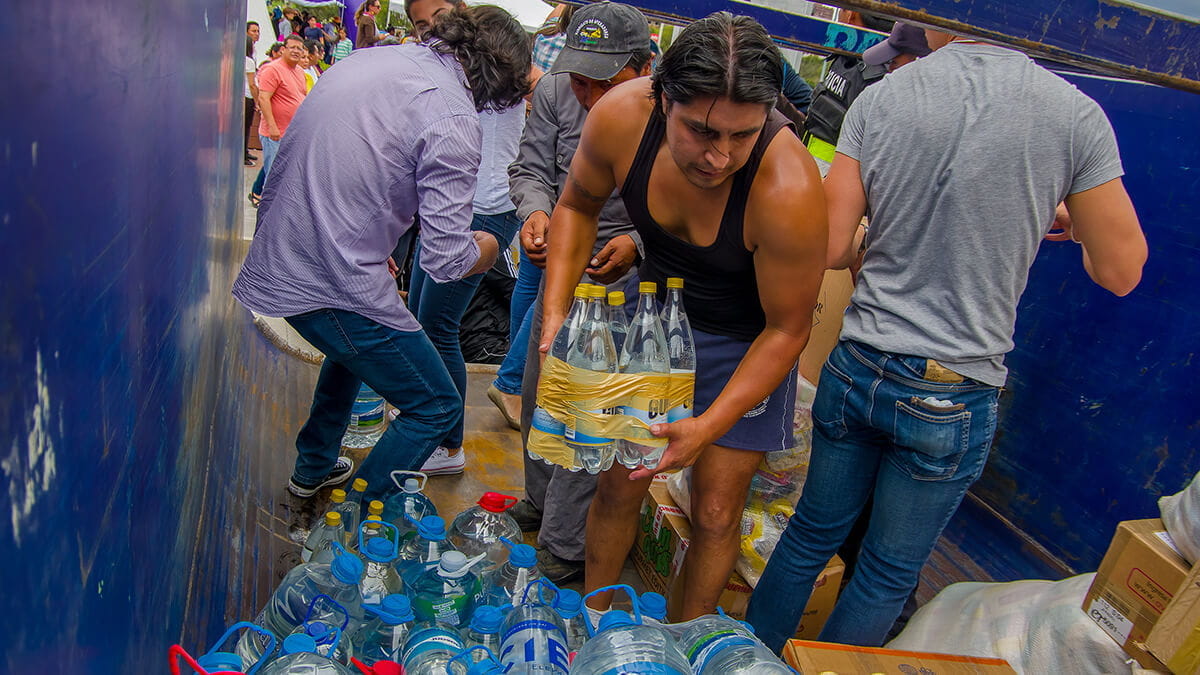Hurricanes. Tsunamis. Earthquakes. Floods. The natural world regularly brings disaster to cities and communities around the world. And those disasters can be catastrophic.
In 2016 alone, natural disasters caused $175 billion in damages* and took the lives of countless people. While governments play a large role in responding to disasters and managing the recovery, many disasters are far too severe for governments to handle on their own. That’s where nonprofits and volunteers come in. Here’s how they help.
Immediate Response
The term “first responder” typically refers to local law enforcement, firefighters, and EMS workers who help save people during a disaster. But, in many instances, citizens can also be first responders. Neighbors will dig out neighbors from collapsed buildings. Families will share food and water with other families. And people of nearby communities will rush to help. The 2017 catastrophic flooding of Houston during Hurricane Harvey inspired numerous civilians to put their personal boats in the water and rescue people stranded in flooded homes.† Without locals volunteering to help save lives, more people would die in disasters.
Relief Efforts
In the days and weeks following a disaster, those who’ve been affected need a great deal of help. In the United States, local, state, and federal government agencies (such as the Federal Emergency Management Agency) assist by providing food, shelter, water, clothes, medical supplies, and other basic services. But they are rarely alone. A large number of nonprofit organizations and many independent volunteers also converge on disaster areas to provide much-needed help to residents.
To coordinate disaster response, many national and regional nonprofits belong to Voluntary Organizations Active in Disaster (VOAD). Through VOAD, nonprofits can help ensure specific relief and recovery efforts aren’t duplicated in communities and that resources go where they’re needed most, particularly to the most vulnerable populations.
Members of VOAD include both religious and secular nonprofit organizations, such as the American Red Cross and The Salvation Army. Some groups, like United Way and The Salvation Army, provide a wide range of services, while other groups offer a core disaster relief specialty. For instance, the Seventh-Day Adventist Church specializes in disaster warehousing—“collecting, logging, organizing, and distributing relief supplies, in cooperation with government disaster response agencies.”‡
In disaster relief situations, nonprofits and volunteers often:
- Distribute clean water and nonperishable food.
- Help demolish homes and businesses damaged in the disaster.
- Clear out fallen trees and other debris.
- Prepare hot meals for community members and first responders.
- Provide clothing and cleaning supplies.
- Provide alternative/temporary housing.
- Provide medical supplies.
- Establish free clinics and provide acute medical care.
- Provide mental health services.
- Provide transportation to the disabled or those without means.
- Rescue and house pets displaced in the disaster.
Long-Term Recovery
A natural disaster may dominate the news for a few days or weeks, but the recovery often takes years. Fortunately, many nonprofits continue to provide services to communities affected by disaster long after initial relief efforts have concluded. Nonprofits focused on long-term recovery efforts often:
- Connect people in need with government services.
- Help residents prepare insurance claims and FEMA forms for various disaster assistance programs.
- Provide funds for rebuilding and/or provide rebuilding services.
- Provide mental healthcare.
- Help organize education for children who’ve lost their school(s).
- Help the community plan for future disasters.
How You Can Help With Disaster Relief and Recovery
Few things are more rewarding than helping people in a time of need. When you earn an MS in Nonprofit Management and Leadership, you can make helping people your career and can even become a leader at a nonprofit that provides disaster relief and recovery services.
Bringing together the concepts of public management and leadership with the goals of social change, a master’s degree in nonprofit management and leadership provides the critical skills needed to be a community leader dedicated to public service. And, thanks to online education, it’s more convenient than ever to earn an MS degree.
When you choose an online university for your MS in Nonprofit Management and Leadership program, you can continue working full time while you earn your online master’s from the comfort of your own home. Online graduate degree programs also offer flexible schedules that let you attend classes at the time of day that works best for you, making it possible for you to hold down a job while earning your graduate degree.
Instead of earning a business degree or management degree, consider the difference you can make with an MS in Nonprofit Management and Leadership. It’s a great way to gain the skills to help people when they need it the most.
Walden University is an accredited institution offering an MS in Nonprofit Management and Leadership degree program online. Expand your career options and earn your degree in a convenient, flexible format that fits your busy life.
*C. Riley, Natural disasters caused $175 billion in damage in 2016, CNN, on the internet at http://money.cnn.com/2017/01/04/news/natural-disaster-cost-insurance-2016/index.html.
† M. Fernandez, On Roads Turned Waterways, Volunteers Improvise to Save the Trapped and Desperate, The New York Times, on the internet at www.nytimes.com/2017/08/29/us/volunteer-rescue-crews-hurricane-harvey-houston.html.
‡ P Singer, Faith groups provide the bulk of disaster recovery, in coordination with FEMA, USA Today, on the internet at www.usatoday.com/story/news/politics/2017/09/10/hurricane-irma-faith-groups-provide-bulk-disaster-recovery-coordination-fema/651007001.
Walden University is accredited by The Higher Learning Commission, www.hlcommission.org.




